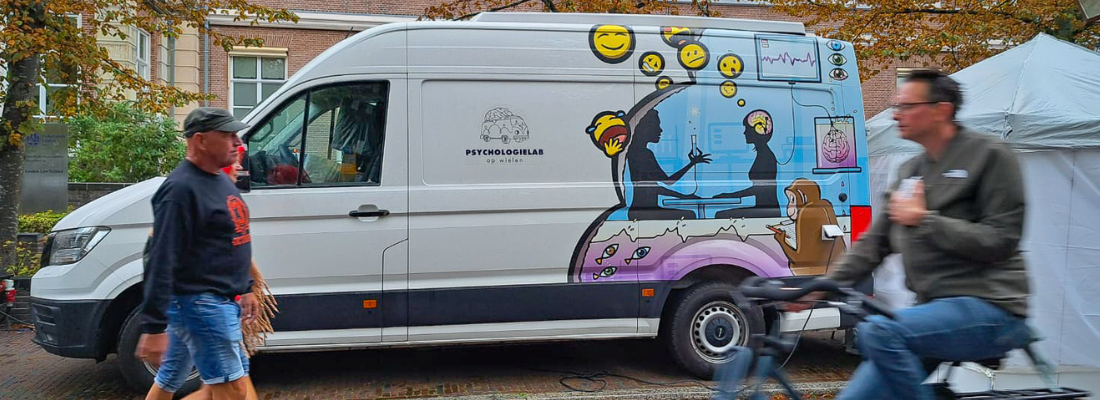Participate in our experiments?
Would you like to join our research in Psychology Lab on Wheels? We currently have two experiments in the van. We will take the utmost care to protect your data and privacy. Join in our experiments.

Three experiments
Much of what we know about facial expressions of emotion is based on acted expressions. For example, a person is asked to look happy, sad, or surprised. However, in day-to-day life, the emotions that people express around is can be much more subtle and ambiguous. Therefore, we are interested in the facial expressions of people who are experiencing genuine, non-acted, emotions.
To investigate this, we will run a series of experiments that elicit genuine facial expressions of emotion, while recording participants’ facial expressions with a camera. The current experiment consists of two parts; one where the participant will look at some pictures, and another where the participant will experience the rubber hand illusion.
The facial images we record will be part of a database that can be used for future research, as well as emotion recognition games that we are developing in our research group.
Over the past few decades, robots have taken hold in our daily lives, for both educational and therapeutic purposes. Sooner or later, they will become an integral part of society.
The advanced versions can talk like us, walk like us and express a wide range of emotions. Some can also hold a conversation or remember the last interaction you had with them. Yet we know very little about how human interaction will be if we change the partner from human to robot.
Our experiments aim to explore how human-robot interaction will take shape by starting from a very basic point: games. Playing games is crucially important for us to develop into healthy adults. We therefore think it important to investigate how the game pattern could change in the presence of a robot.
Two participants will play multiple rounds of a coin-toss game with a robot, an avatar on a screen or against each other. We will measure pupil size via eye-tracking during the entire experiment.
We expect this experiment to shed some light on the nature of human-robot interaction and hope it can provide insight into the possible integration of robots into our society.
Imagine a world where emotions speak volumes in silence, where the subtlest facial expressions and the tiniest shifts in body language hold the key to hidden harmony.
In this study, we aim to unravel the secrets behind human interactions and decision-making, peering into the depths that often elude our conscious perception. We are curious to explore individual differences, cultural influences and dilemma scenarios and hope to gain a deeper understanding of human connection and decision-making.
During the study, you'll team up with another participant, and play a game that involves making tough decisions with moral and ethical aspects. It’s a chance for us to see how participants navigate these challenging situations and how their emotions come into play.
To gather data, we’ll use physiological measures and video recording to capture facial expressions and body language to see if there are any hidden emotions that participants might not even be aware of. Importantly, all data will be treated in compliance with the General Data Privacy Regulation (GDPR).
Data protection and privacy
At Psychology Lab on Wheels, we take your privacy and the security of your personal data very seriously. We ensure that all information collected during this study is handled in accordance with the General Data Protection Regulation (GDPR).
Read more about Data protection and privacy

